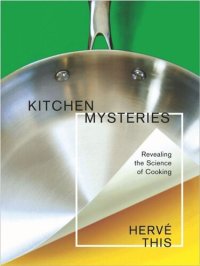
Ebook: Kitchen Mysteries: Revealing the Science of Cooking
Author: Hervé This, Jody Gladding
- Year: 2007
- Publisher: Columbia University Press
- Language: English
- pdf
International celebrity and co-founder of molecular gastronomy Hervé This answers such fundamental questions as what causes vegetables to change color when cooked and how to keep a soufflé from falling. Sharing the empirical principles chefs have valued for generations, he shows how to adapt recipes to available ingredients and how to modify proposed methods to the utensils at hand. His revelations make difficult recipes easier and allow for even more creativity and experimentation in the kitchen.
An international celebrity and founder of molecular gastronomy, or the scientific investigation of culinary practice, Hervé This is known for his ground-breaking research into the chemistry and physics behind everyday cooking. His work is consulted widely by amateur cooks and professional chefs and has changed the way food is approached and prepared all over the world.
In Kitchen Mysteries, Hervé This offers a second helping of his world-renowned insight into the science of cooking, answering such fundamental questions as what causes vegetables to change color when cooked and how to keep a soufflé from falling. He illuminates abstract concepts with practical advice and concrete examplesfor instance, how sautéing in butter chemically alters the molecules of mushroomsso that cooks of every stripe can thoroughly comprehend the scientific principles of food.
Kitchen Mysteries begins with a brief overview of molecular gastronomy and the importance of understanding the physiology of taste. A successful meal depends as much on a cook's skilled orchestration of taste, odors, colors, consistencies, and other sensations as on the delicate balance of ingredients. Hervé then dives into the main course, discussing the science behind many meals' basic components: eggs, milk, bread, sugar, fruit, yogurt, alcohol, and cheese, among other items. He also unravels the mystery of tenderizing enzymes and gelatins and the preparation of soups and stews, salads and sauces, sorbet, cakes, and pastries. Hervé explores the effects of boiling, steaming, braising, roasting, deep-frying, sautéing, grilling, salting, and microwaving, and devotes a chapter to kitchen utensils, recommending the best way to refurbish silverware and use copper.
By sharing the empirical principles chefs have valued for generations, Hervé This adds another dimension to the suggestions of cookbook authors. He shows how to adapt recipes to available ingredients and how to modify proposed methods to the utensils at hand. His revelations make difficult recipes easier to attempt and allow for even more creativity and experimentation. Promising to answer your most compelling kitchen questions, Hervé This continues to make the complex science of food digestible to the cook.